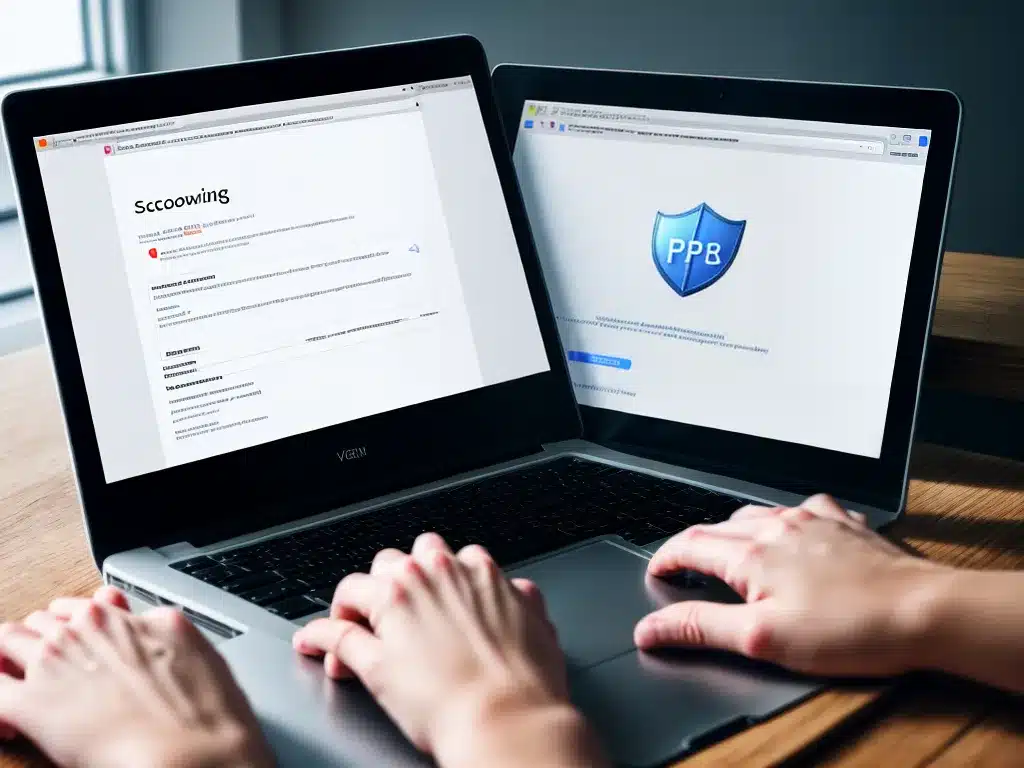Secure Web Browsing in 2024 – Using VPNs and Privacy Tools
Introduction
In 2024, online privacy and security will be more important than ever. As our digital lives expand, more of our sensitive information is out there on the web. Fortunately, there are steps we can take to better protect our data and browse the internet more securely using tools like VPNs (virtual private networks).
In this article, I will provide an in-depth look at the best practices for secure web browsing in 2024. We’ll cover topics like:
- The risks of unsecured web browsing
- How VPNs work to encrypt traffic and mask your IP address
- The top VPN providers to consider in 2024
- Browser privacy extensions to enhance security
- Other privacy tools and practices for anonymous browsing
Equipped with the right information and tools, we can enjoy the convenience of the internet while keeping our identities, locations, and sensitive data protected. Let’s dive in!
The Risks of Unsecured Web Browsing
Browsing the web without protection opens us up to a host of potential security and privacy risks. Here are some of the main threats to be aware of:
-
Surveillance and tracking – Our online activity is constantly tracked by advertisers, ISPs, and other third parties. This can include sites we visit, searches we make, products we view, and more.
-
Data harvesting – Hackers and malicious sites collect user data like passwords, financial information, and other sensitive details. Unsecured public Wi-Fi is especially risky.
-
Location tracking – Your IP address provides information about your physical location, which you may want to keep private for security.
-
Personalized ads and price discrimination – Your browsing history is used to serve targeted ads and dynamically adjust pricing based on your interests and perceived income level.
-
Identity theft – Criminals can steal usernames, passwords, banking details, and other information to access accounts and commit fraud under your identity.
-
Malware infections – Accessing compromised sites or unsafe links can infect your device with viruses designed to steal data and spy on your activity.
Without adequate online privacy measures, we hand over a shocking amount of personal data as we browse. Next, let’s explore how VPNs help mitigate these risks.
How VPNs Enhance Privacy and Security
A VPN, or virtual private network, encrypts your internet traffic and routes it through a remote server run by the VPN provider. This provides several key advantages:
-
Encrypted data – VPNs use protocols like OpenVPN and WireGuard to encrypt your traffic so that your online activities are hidden from prying eyes.
-
Alternative IP address – Your network traffic appears to originate from the VPN server, masking your real IP address and location.
-
Access blocked content – VPNs allow you to bypass geography-based content blocks and internet censorship.
-
Public Wi-Fi security – Connecting through a VPN secures your browsing on public hotspots and other unsecured networks.
-
Hide traffic from ISP – Your internet service provider can’t monitor or log your activity when you’re protected by a VPN.
So in summary, VPNs create an encrypted tunnel to shield your online presence. Top providers offer extra privacy perks too, like a no-logging policy.
The Top VPNs for Privacy in 2024
The VPN market is packed with contenders, but these 5 providers stand out for prioritizing user privacy:
-
NordVPN – Panama-based provider with robust no-logging policy and anti-censorship mission. Offers Onion over VPN for browsing on Tor.
-
ProtonVPN – Operates outside spying jurisdictions and offers perfect forward secrecy encryption. Built by the makers of ProtonMail.
-
Surfshark – Based in the British Virgin Islands. Fast performance and allows unlimited device connections.
-
CyberGhost – Romania-based company focused on security, strict no-logs, and top-notch speeds.
-
ExpressVPN – Has stood the test of time as a reliable privacy champion based in the British Virgin Islands.
I recommend reading through detailed VPN reviews to decide which provider best suits your needs and budget. It’s worth investing in a premium privacy-focused VPN.
Browser Privacy Extensions
VPNs protect your network traffic, while browser extensions like these fortify privacy at the browser level:
-
uBlock Origin – An efficient, lightweight ad blocker that enhances pageload speeds and blocks hidden trackers.
-
HTTPS Everywhere – Automatically forces connections to use secure HTTPS encryption when available.
-
Privacy Badger – Blocks covert third-party trackers found on pages like Facebook and Google ads.
-
Decentraleyes– Local emulates content delivery networks to avoid data harvesting by major CDNs.
-
Cookie AutoDelete – Automatically erases cookies from sites when you close the tab to prevent tracking.
Install privacy extensions like these in browsers on all your devices to prevent companies from profiling your web activity.
Other Ways to Browse Anonymously
Beyond VPNs and browser tools, there are additional methods to improve anonymity:
-
Use the Tor network – Tor bounces your traffic through a global volunteer relay system to achieve deep anonymity. Combine with a bridge for censorship circumvention.
-
Try a private search engine – DuckDuckGo and Startpage deliver private search without tracking and personalization.
-
Watch out for webRTC leaks – Disable WebRTC in your browser to prevent leaking your real IP address.
-
Create anonymous accounts – Sign up for online services using burner email addresses and fake details when possible.
-
Use multi-hop proxies – Adding proxies on top of your VPN connections enhances privacy by routing through multiple servers.
With some diligence, we can avoid leaving a digital trail of personal footprints as we use the web in 2024 and beyond.
Closing Thoughts
As the web evolves, our privacy faces greater risks from all sides. But by leaning on proven privacy technologies like VPNs, we can securely access the internet’s wealth of information and resources. Combined with smart browsing habits, these tools allow us to avoid surveillance, protecting our identities and sensitive data from compromise.
With VPN usage on the rise, I expect privacy-first providers to continue innovating to stay steps ahead of the next generation of online threats. But users also need to remain vigilant – there’s always room for improvement when it comes to personal cybersecurity.
By putting our privacy first, we can confidently unlock the possibilities of the web while keeping our personal information secure. Here’s to a private browsing future.












